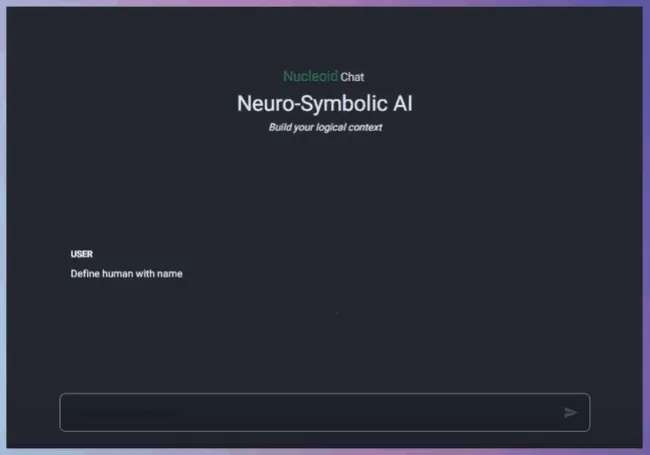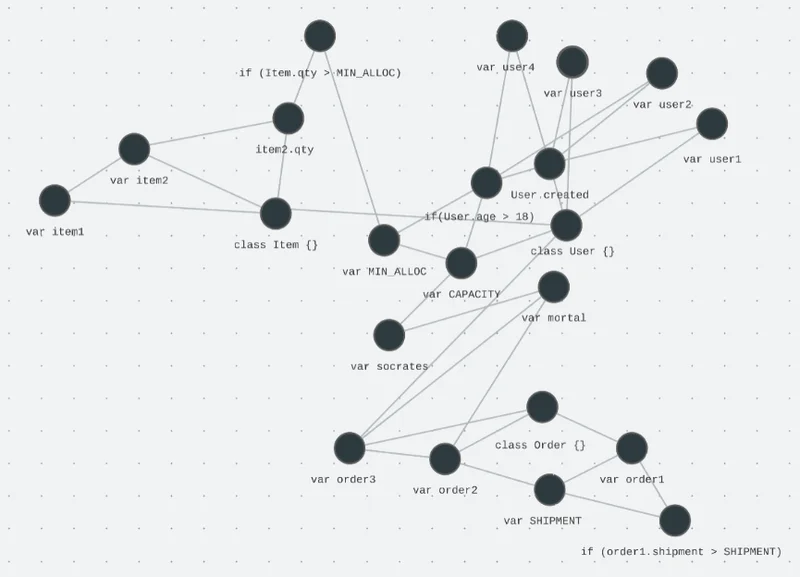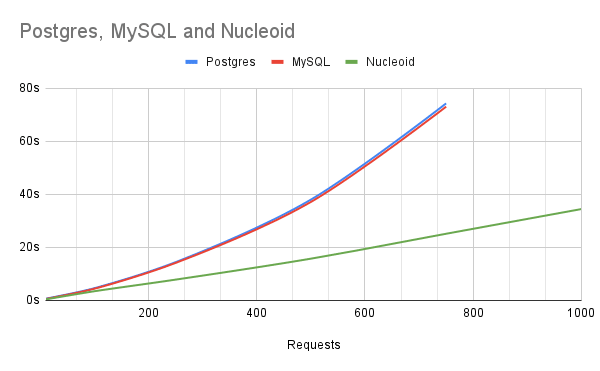Nucleoid is a Declarative (Logic) Runtime Environment, which is a type of Symbolic AI used for reasoning engine in Neuro-Symbolic AI. Nucleoid runtime that tracks given statements in JavaScript syntax and creates relationships between variables, objects, functions, etc. in the logic graph. In brief, the runtime translates your business logic to a fully working application by managing the JavaScript state as well as storing in the built-in data store, so that your application doesn't require an external database or anything else.

Neural Networks: The Learning Component
Neural networks in Neuro-Symbolic AI are adept at learning patterns, relationships, and features from large datasets. These networks excel in tasks that involve classification, prediction, and pattern recognition, making them invaluable for processing unstructured data, such as images, text, and audio. Neural networks, through their learning capabilities, can generalize from examples to understand complex data structures and nuances in the data.
Symbolic AI: The Reasoning Component
The symbolic component of Neuro-Symbolic AI focuses on logic, rules, and symbolic representations of knowledge. Unlike neural networks that learn from data, symbolic AI uses predefined rules and knowledge bases to perform reasoning, make inferences, and understand relationships between entities.
This aspect of AI is transparent, interpretable, and capable of explaining its decisions and reasoning processes in a way that humans can understand.

Declarative Logic in Symbolic Reasoning
Declarative logic is a subset of declarative programming, a style of building programs that expresses the logic of a computation without describing its control flow. In declarative logic, you state the facts and rules that define the problem domain. The runtime environment or the system itself figures out how to satisfy those conditions or how to apply those rules to reach a conclusion. This contrasts with imperative programming, where the developer writes code that describes the exact steps to achieve a goal.
Symbolic reasoning refers to the process of using symbols to represent problems and applying logical rules to manipulate these symbols and derive conclusions or solutions. In AI and computer science, it involves using symbolic representations for entities and actions, enabling the system to perform logical inferences, decision-making, and problem-solving based on the rules and knowledge encoded in the symbols.
By integrating Nucleoid into Neuro-Symbolic AI, the system benefits from enhanced interpretability and reliability. The declarative logic and rules defined in Nucleoid provide clear explanations for the AI's decisions, making it easier for users to understand and trust the system's outputs. Furthermore, the explicit reasoning capabilities help ensure that decisions are made based on logical principles, adding a layer of reliability and consistency to the AI's behavior.

Hello World ⚡
User:
> 'Define human with name'
Assistant:
> 'The user requested to define a human with a name using a declarative class'
---
// Ubiquitous Code:
'use declarative';
class Human {
name: string;
constructor(name: string) {
this.name = name;
}
}
User:
> 'All humans are mortal'
Assistant: All humans are mortal
> 'All humans were declared as mortal.'
---
// Ubiquitous Code:
'use declarative';
$Human.mortal = true;
User:
> 'Create a human with name "Socrates"'
Assistant:
> 'A human named 'Socrates' was successfully created.'
---
// Ubiquitous Code:
'use imperative';
var human1 = new Human('Socrates');
// Result: {"id":"human1","name":"Socrates","mortal":true}
User:
> 'Is human with name 'Socrates' mortal?'
Assistant:
> 'The human named 'Socrates' was determined to be mortal.'
---
// Ubiquitous Code:
`use imperative`;
var human1 = new Human('Socrates');
human1.mortal;
// Result: true
💡 This executes the business logic and stores the state in the data store.
const app = nucleoid()manages internal data store without requiring an external database.
Learn more at
Under the Hood: Declarative (Logic) Runtime Environment
Nucleoid is an implementation of symbolic AI for declarative (logic) programming at the runtime. As mentioned, the declarative runtime environment manages the JavaScript state and stores each transaction in the built-in data store by declaratively rerendering JavaScript statements and building the knowledge graph (base) as well as an execution plan.

The declarative runtime isolates a behavior definition of a program from its technical instructions and executes declarative statements, which represent logical intention without carrying any technical detail. In this paradigm, there is no segregation regarding what data is or not, instead, it approaches how data (declarative statement) is related to others so that any type of data including business rules can be added without requiring any additional actions such as compiling, configuring, restarting as a result of plasticity.
This approach also opens possibilities of storing data in the same box with the programming runtime.
In short, the main objective of the project is to manage both data and logic under the same runtime. The declarative programming paradigm used by Nucleoid allows developers to focus on the business logic of the application, while the runtime manages the technical details. This allows for faster development and reduces the amount of code that needs to be written. Additionally, the sharding feature can help distribute the load across multiple instances, which can further improve the performance of the system.
Benchmark
This is the comparison of our sample order app in Nucleoid IDE against MySQL and Postgres with using Express.js and Sequelize libraries.

Performance benchmark happened in t2.micro of AWS EC2 instance and both databases had dedicated servers with no indexes and default configurations.
This does not necessarily mean Nucleoid runtime is faster than MySQL or Postgres, instead, databases require constant maintenance by DBA teams with indexing, caching, purging, etc. However, Nucleoid tries to solve this problem by managing logic and data internally. As seen in the chart, for applications with average complexity, Nucleoid's performance is close to linear because of the on-chain data store and in-memory computing model as well as limiting the IO process.
⭐️ Star us on GitHub for the support
Thanks to declarative logic programming, we have a brand-new approach to Neuro-Symbolic AI. As we continue to explore the potential of this AI architecture, we welcome all kinds of contributions!


